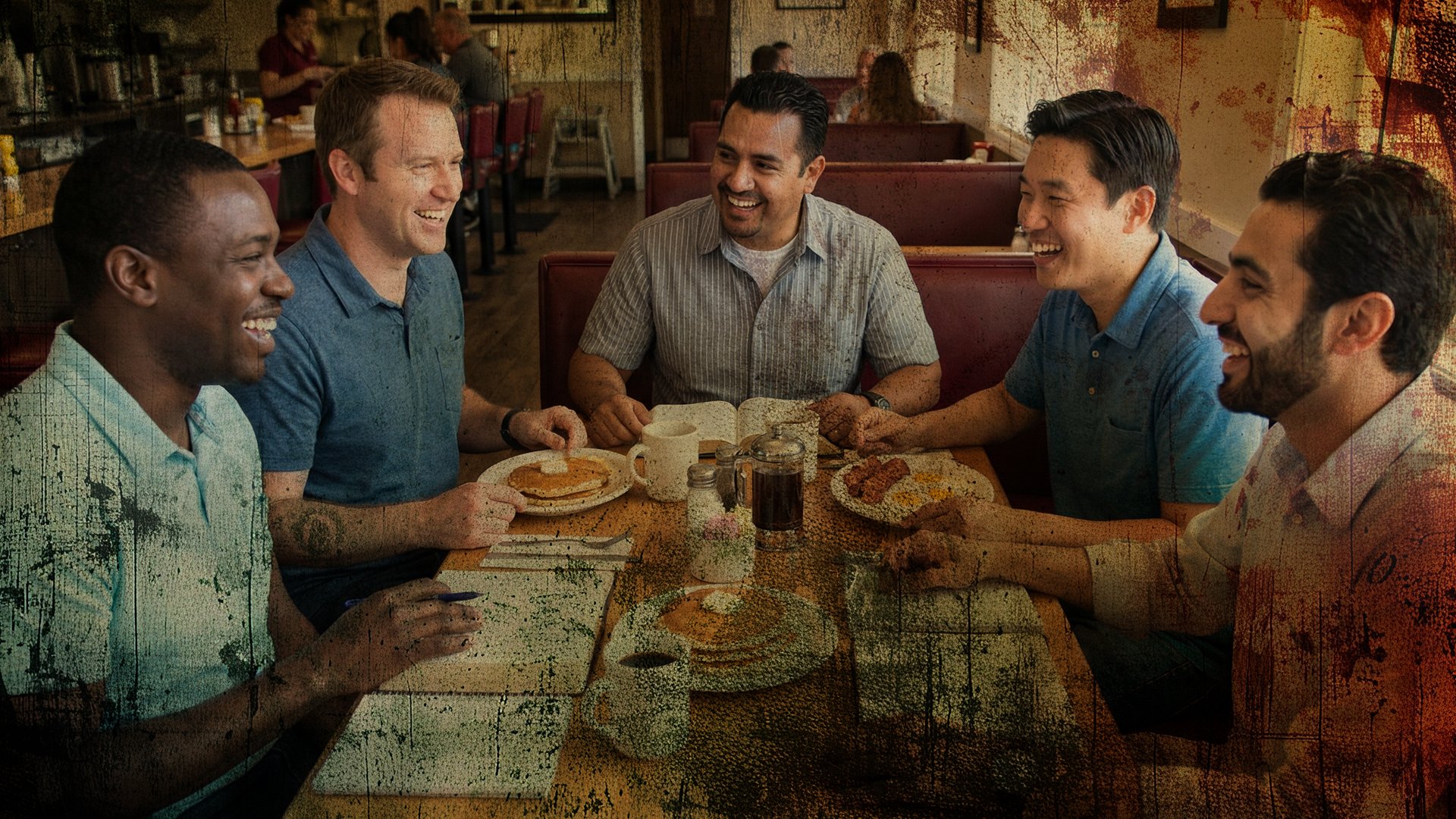Here are some common questions we receive from table leaders, and some suggestions for how to maintain best practices and grow in life and leadership.
Do I have to use the provided curriculum? No, table leaders are free to discuss any biblical topic or series they want. There are many excellent studies out there, and as a seasoned leader you can use your discretion in this. However, be sure to keep to the best practices. Use the Learn, Live and Lead formula for questions. Open the Bible each and every week—don’t just discuss a topic, book or leadership talk. Finally, be sure to connect a man’s leadership to the discussion—how will the Bible discussion impact and improve his leadership in the coming week? The advantage of using our Men’s Table prepared curriculum is that all of these facets of the discussion are baked in to the lessons we provide.
What happens when a discussion gets off track? Reel it in and watch the clock. If you find the discussion going off on a tangent, don’t be afraid to interrupt and encourage the men to get back on topic. There should be time for Learn (icebreaker) questions, but don’t let this dominate your time together. In the back of your mind, always be thinking, how will this discussion help grow the men and help them lead more effectively? If the discussion isn’t leading you to helpful comments, don’t be afraid to steer the ship in a more productive direction.
How much emphasis should I put on inviting men? It’s imperative that the men at your table develop a burden to influence men in their circles. Each and every time you meet, encourage them to invite coworkers, friends, family members and others in there sphere of influence. If you go 3-4 weeks without seeing a new face, consider taking time during your closing prayer to mention inviting men, and to specifically pray by name for men you and others will invite. Set the example as the table leader by inviting a new man each and every week.
What is the ideal number of men at my table? The best results are no less than four, but no more than ten, with 6-8 being ideal. If your table is consistently small, four or less, spend time emphasizing inviting new men. If your table is consistently large, more than 10 men, identify a potential leader at your table and make concrete plans to split the group in two. Too few men and the table dies. Too many men, and the table atrophies into a social club.
What should I do during a political season? Politics are a topic to avoid at a Men’s Table. Political personalities and views only divide the group. If there is a particular current event or political happening that demands some attention, consider the only appropriate and helpful response: prayer. Pray for political leaders on both sides. Pray for godly wisdom and counsel for those in government and public service. Pray for unity of men around the Spirit and Truth of Scripture. Never allow a specific political viewpoint, or candidate, to become the topic of the day’s discussion.
Should I go for milk or meat? Men are at all levels of spiritual development. At your table, you may find that even basic questions of a spiritual nature pose a challenge to the group—they’re only ready for “milk”. On the other hand, with more mature men, the depth of the conversation may go beyond the provided questions—they’re wanting more “meat”. As a table leader, “going deep” is the end-goal for the group, as the more involved the men are in the conversation, the greater its value to them. The provided questions in our discussion guides are generally of a more “milky” nature that are applicable to men at all levels of spiritual development. Don’t be afraid, though, to go beyond these when your men want to.
What about women as leaders? There are many excellent women leaders, and other ministries and programs that support women specifically, or are open to men and women. Our Men’s Table format is geared to men only. It’s helpful to men (just as it is to women) to have places where they can talk about gender-specific issues. Our belief is that there is room for Christ-centered leadership development opportunities that are specific to various groups. We have geared our meetings to men for 40+ years and believe we are most effective as an organization connecting to and growing men as biblical leaders.
What destroys a table? Some tables flourish and grow, others languish and die. Primarily, a table gets in trouble when the leader fails to keep to the purpose for which it was created: discussing issues of Christian leadership, and growing men as husbands, fathers and leaders. Topics and agendas that take you off this focus will have your men quickly questioning whether it’s worth their time. They won’t tell you to change what you’re doing—they’ll just stop coming. When you see men dropping out, one question to ask is, am I keeping to the main thing?
What if a man needs help outside of the table? A man can have a crisis—lose his job, make a moral mistake, break his marriage, get disconnected from his children, any number of things. He should be able, over time, to share these issues with his table. As a table, you should respond in prayer first. If one or more men at the table can help meet a specific need, then do so. Tables are not designed to be support groups, but support is one way you can show love and concern for your fellow man. You will not be able to meet every need that comes along, but as there is a consensus among men at the table, prayerfully help in those areas where you can.
What should be my first series of discussion at my table? We have a number of options available at leadmin.org/series. Any of them will make an excellent series of talks starting out, primarily because they are all designed around our Learn, Live, Lead formula.
What if I have more questions? Our staff team is here to serve you and answer your questions. Contact us via leadmin.org/contact. As we serve hundreds of leaders at locations all around the world, allow us a few business days to respond.
Cover photo: Shutterstock















A creed is a formal statement of essential beliefs. The word “creed” comes from the Latin “credo” meaning, “I believe.” You can adopt The Brothers’ Creed as a statement of belief for your Men’s Table.